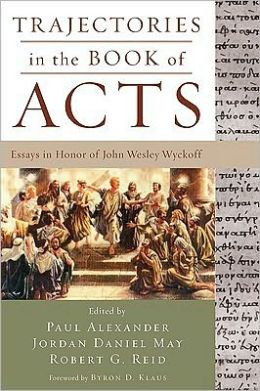Trajectories in the Book of Acts
 Paul Alexander, Jordan Daniel May, and Robert G. Reid, eds., Trajectories in the Book of Acts: Essays in Honor of John Wesley Wyckoff (Eugene, OR: Wipf & Stock, 2010), 373 pages, ISBN 9781606085400.
Paul Alexander, Jordan Daniel May, and Robert G. Reid, eds., Trajectories in the Book of Acts: Essays in Honor of John Wesley Wyckoff (Eugene, OR: Wipf & Stock, 2010), 373 pages, ISBN 9781606085400.
Trajectories in the Book of Acts is an anthology of fifteen essays by fifteen different writers in honor of John Wesley Wyckoff, who in 2010, completed thirty-four years as Professor of Bible and Theology at Southwestern Assemblies of God University in Waxahachie, where he is still actively teaching. Wyckoff re-introduced biblical hermeneutics into the curriculum in 1978 and laid great emphasis upon the teaching of Biblical Theology. During his tenure, Wyckoff has taught extensively on the New Testament book of Acts and it has became the subject of much of his work in biblical interpretation. It is by virtue of his great attention to Acts that the essayists chose their title. By the use of the term “trajectories” the different writers refer to the paths or “lines of development” that Wyckoff followed to make clear Luke’s intent when he wrote Acts of [the] Apostles.
The different contributors are both former students of Wyckoff and fellow academic colleagues both within and without the Assemblies of God affiliation of which Wyckoff is an ordained minister. Byron D. Klaus, the President of Assemblies of God Theological Seminary in Springfield, Missouri, supplies a forward to the work edited by Alexander, May, and Reid, all former students of Wyckoff.
This reviewer does not know John W. Wyckoff personally, he is well familiar with his reputation as a skilled biblical interpreter and with his seminal work, Pneuma and Logos: The Holy Spirit in Biblical Hermeneutics (Wyckoff’s Ph.D. dissertation, originally). It is also difficult to ascertain which of the essays written by former students reflect Wyckoff’s own investigations and lectures in the area of biblical interpretation. There are statements honoring Wyckoff’s work but nothing said about his influence upon their own personal reflections. There is no question about the inspiration he left upon those writers.
Chapter one, written by Brue E. Rosdahl, furnishes a brief biography of Wyckoff and supplies a summary of Wyckoff’s subsequent ministry and theological “positions” leading to his eventual concentration in biblical theology and biblical hermeneutics. Wyckoff holds to basic “reformed” convictions: the unity of the Biblical witness, its covenantal theme, and the sovereignty of Christ Jesus along with the leading power of the Holy Spirit in faith and life.
In one way or another, all the essays explore avenues of biblical interpretation that Wyckoff opened up in understanding Luke’s intentions when he related the spread of the gospel in Acts of [the] Apostles. The one exception is the contribution by Roger Stronstad, a good friend of Wyckoff’s who has taught for many years at Regent College and Summit Pacific College, both in British Columbia. Stronstad reiterated his perception of the Baptism in the Holy Spirit, as recorded by Luke in Acts, as having more of a vocational significance than a soteriological one. He first expressed this understanding in his 1984 book The Charismatic Theology of St. Luke (Hendrickson, 1984, pp. 1,12,83). Other essays opened some doors of understanding not before apparent to this reviewer and forcing this reviewer to re-read both Luke and Acts. A former student of Wyckoff’s, Mario Escabedo II, who, himself teaches at Southwestern Assembly of God University, explored Luke’s ecphrastic vocabulary and phraseology which has a visual effect as much as it has an acoustical or auditory one. Rob Starner, also a colleague of Wyckoff and Escabedo at SAGU, investigated passages in Luke, Acts, and Hebrews that were not just similar to each other but were triplicates of each other. Starner proposes that Luke and Paul were both co-laborers and collaborators.
Category: Biblical Studies, Pneuma Review, Spring 2012


